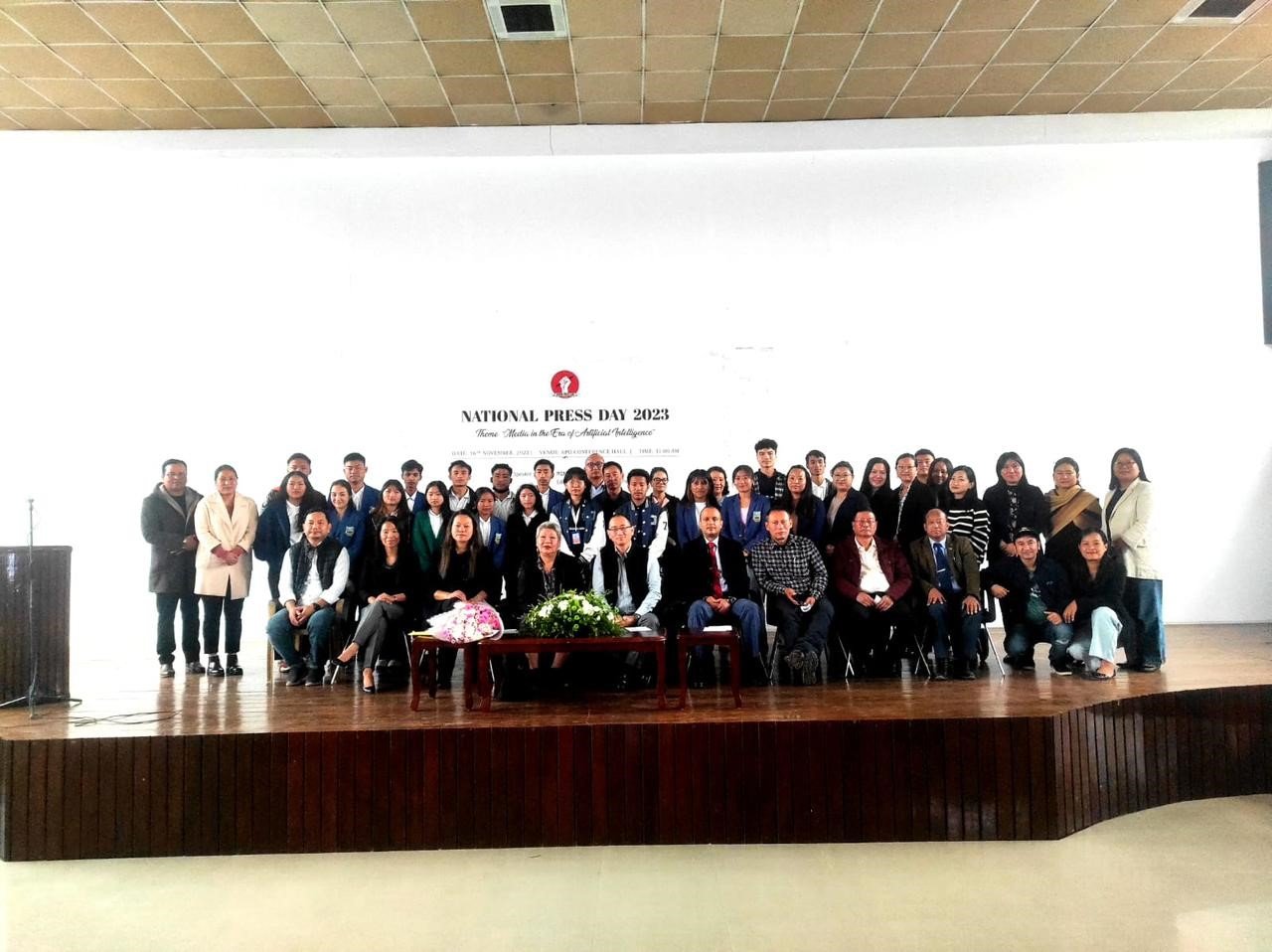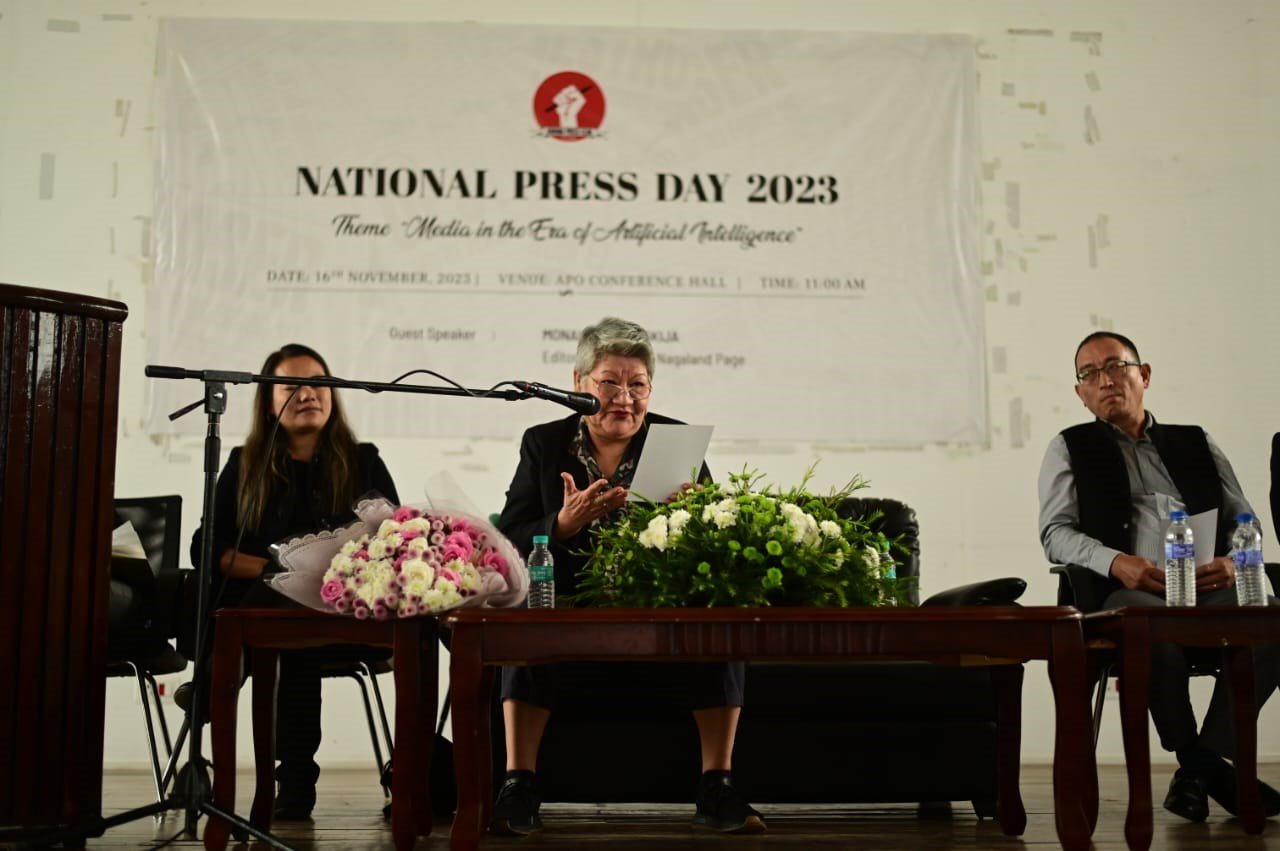The Kohima Press Club (KPC) celebrated the National Press Day today under the theme “Media in the era of Artificial Intelligence” at APO Conference hall,Kohima.
Guest Speaker Monalisa Changkija, Editor and Publisher, Nagaland Page, in her speech mentioned that today is a very significant day for the media across the country and indeed in Nagaland,especially as this institution, which has always been targeted since its inception across the globe, is now particularly under severe stress and unprecedented threat, both in conflict zones and seemingly democratic and peaceful countries and societies.
“Now with extremely sophisticated scientific and technological innovations and inventions, we face newer threats. The 2023 National Press Day’s theme ‘Media in the Era of Artificial Intelligence’ is indeed very appropriate since today Artificial Intelligence (AI) is a serious concern across the spectrum, and also has enormous ramifications for the media, one way or the other,” warned Changkija.
While there is an increasing body of information on AI, Changkija opined, it is quite clear that there is much more for us to learn about AI to conclude it as a friend or foe and depending on our motives, agenda and moral compass, it could be either.

The Naga Writer viewed that AI lack creativity and empathy limiting its ability to understand emotions or produce original ideas which is a serious concern for the media whose work is meant to be based on creativity, empathy and originality. With AI being predicted to grow increasingly pervasive as technology develops, revolutionizing sectors including healthcare, banking and transportation, Changkija questioned, “But what about the media? Will we grow or perish with AI?”
She added that technology had increasingly made human beings redundant leading to unemployment and even ending numerous cultures and creations born of the human heart, mind and hands.

“With all technology, AI too would eventually work out much cheaper if used, so wouldn’t the media, as an institution, mandated to uphold democratic ethics, cultures and traditions pay a steep price?” she questioned.
“Our identity as human beings has been reduced to our numerous codes and card numbers, in fact, now we simply don’t exist without our technologically generated numbers. Then there is the issue of the right to privacy, of which we haven’t even started a discourse in Nagaland,” pointed out Changkija, adding that technology is not all-inclusive with the existing digital divide in evidence.
While Technology is said to make life be simpler, Changkija diverged because human being is excluded from the technology-driven world, citing that during the pandemic, millions of children were denied online education.
Changkija also viewed that the media also need to question what our Governments and corporate are selling to us “in education, health, agriculture, infrastructure development, everything, including our political, social, economic and cultural narratives”. And the media need to inform its findings to the people. “Take education or health for instance – we need to question whether AI would rescue or raid us,” stated Changkija
It is important that technology also must be owned by the people, asserted Changkija, and this is where the media must play its leadership role by placing the human being in the centre of the era of AI.
Download Nagaland Tribune app on Google Play

“The wonders of technology are numerous and indescribable. However, seeing that there is no dearth of intelligence AI being a result. I wonder why this intelligence have not been used to innovate and invent artificial common sense, which Madam Chair, Friends and Colleagues, you will agree, is in very short supply in today’s technology-driven world,” concluded Changkija.
During the event, the KPC-NBOCWWB certificates were also handed out to the 2024 Fellows. Sharing her experience, Reyivolu Yhosa stated that the challenges faced by construction workers, both local and migrant, are immense. “They put their life at risk to earn income from the only job they know; sometimes facing accidents or even death while at work and they are often exploited by others where their hard labours goes unpaid and they are compelled to go home to their kids and wives empty handed,” said Yhosa.
Thejoto Neinu stated that over the course of this fellowship, he delved into the intricate fabric of Nagaland’s construction sector, uncovering stories that deserve attention and understanding. He added that in the heart of Nagaland, where the tradition intertwines with progress, Naga women are rewriting narratives in various sectors. However, breaking through barriers in the construction industry remains an uphill battle, and the journey of women venturing into this male-dominated realm is both compelling and challenging. While the male construction workers also faced it’s own battle and thrives.
“As we reflect on these insights, let us collectively recognize the power of storytelling in fostering change. Each narrative shared contributes to a more informed, empathetic, and equitable society,” said Nienu.

